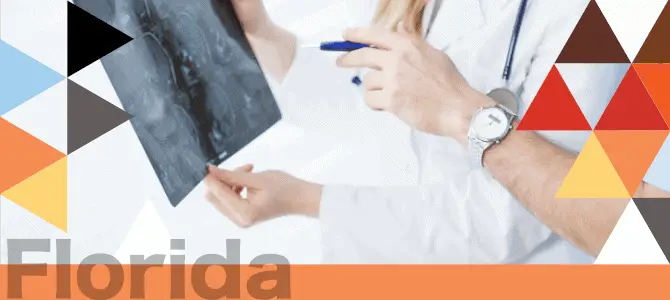Radiation Therapy Schools in Florida

There are two programs in Florida that offer non-degree holders the opportunity to study directly for an accredited associate degree in Radiation Therapy. These programs have a two-year duration. Completion of one of these programs will ensure that the graduate is eligible to apply for state licensure and apply to the American Registry of Radiologic Technologists (ARRT) to obtain professional credentials.
For candidates with an existing baccalaureate degree, undertaking an accredited post-graduate certificate in Radiation Therapy is an alternative option. There are two of these types of programs available in Florida. The duration of these programs is typically 15-16 months. Completion of one of these programs will be sufficient to ensure that the graduate is eligible to apply for a license to practice in Florida plus apply for professional credentials from ARRT.
As Florida does not require candidates for licensure as a Radiation Therapist to hold ARRT credentials, completion of a two-year general Radiologic Technologist associate degree would also make an applicant eligible for licensure as a Radiation Therapist in Florida. However, completion of a general Radiologic Technology associate degree would need to be followed by additional ARRT-approved studies specifically in Radiation Therapy in order for the graduate to be eligible to apply for ARRT credentials as a Radiation Therapist. At the time of writing, there were no programs available in Florida that would enable a holder of an associate degree in Radiologic Technology to pursue additional approved studies specifically in Radiation Technology in order to obtain professional credentials as a Radiation Therapist from ARRT.
In This Article
View also:
- View radiologic technology schools in Florida
- Learn about radiation therapy education & career requirements
How to obtain professional credentials as a Radiation Therapist in Florida
The credential-awarding body for Radiation Therapists is the American Registry of Radiologic Technologists (ARRT). The majority of Radiation Therapists choose to obtain professional credentials as they help to guarantee that the holder has achieved the expected standard of knowledge and competence to practice safely and effectively as a Radiation Therapist.
In particular, professional credentials help to assure prospective employers of the credibility of candidates when they apply for roles as Radiation Therapists. In addition, although Florida does not require ARRT credentials for licensure, the majority of states do require Radiation Therapists to hold these credentials.
ARRT has three requirements that candidates for professional credentials must meet.
Requirement 1
The first is to maintain the ARRT standards of ethical behavior. These are fully detailed in the ARRT Standard of Ethics document plus candidates must provide acceptable answers to a selection of ethics-related questions on their application form.
Requirement 2
The second ARRT criteria for conferring professional credentials is that the individual can demonstrate that they have completed a minimum of an associate-level degree and completed a specific program of education as a Radiation Therapist. Both educational programs must have been completed at an accredited institution.
There are various ways to meet this requirement. A candidate may complete an associate degree in Radiation Therapy that would satisfy both requirements at once. Alternatively, a candidate could complete a baccalaureate degree in a different field and then complete a post-baccalaureate certificate in Radiation Therapy. This combination would also satisfy the educational requirements of ARRT.
Requirement 3
Finally, candidates must pass the ARRT examination by achieving a scaled score of 75 on the four-hour computer-based test. The test examines the same curriculum covered by an associate degree or post-graduate certificate in Radiation Therapy, therefore recent graduates of these educational programs will be familiar with the knowledge required. This includes radiation safety and quality, patient care and communication, treatment planning and delivery, and overarching concepts of radiation oncology.
ARRT credentials must be renewed bi-annually by completion of Continuing Education credits and once a decade by completion of Continuing Qualification credits.
How to become a licensed Radiation Therapist in Florida
The Florida Department of Health is accountable for licensing Radiation Therapists within Florida. Candidates for the first-time licensure in Florida must provide evidence of completion of an accredited two-year Radiologic Technology Program and are then required to demonstrate that they are of a good moral character and pass a computer-based examination.
It is worthy of note that the Florida Department of Health does not currently require candidates for the first-time licensure to hold ARRT credentials. The examination for Florida licensure is broadly similar in content to the content of the examination required to obtain professional credentials from ARRT, however, both examinations must be completed if a candidate is seeking both credentials and licensure.
For candidates licensed in other states who are subsequently seeking licensure in Florida, a different set of criteria apply. Candidates for this type of licensure must show evidence of completion of an accredited two-year Radiologic Technology program and proof of ARRT credentials. However, they are not required to pass the Florida examination.
Sponsored Programs
The College of Health Care Professions , Online
Location - Mcallen, TX, US 78504The College of Health Care Professions is a Texas-based career education school founded by physicians in the Texas Medical Center solely specializing in healthcare education and dedicated to provid... Read More
ProgramsLimited Medical Radiologic Technologist with MA Skills - Certificate
Accredited Radiation Therapy Schools in Florida
21st Century Oncology, Inc. School for Radiation Therapy Technology
21st Century Oncology is a large provider of cancer care services and the largest radiation oncology provider in the US. The organization is headquartered in Fort Myers while the School for Radiation Therapy Technology is located in Cape Coral.
The school offers a 16-month post-baccalaureate certificate in Radiation Therapy which has been accredited by the Joint Review Committee on Education in Radiologic Technology (JRCERT). The goals of the program are to develop clinical competence, professionalism, critical thinking, and problem-solving skills. In addition to holding a baccalaureate degree, candidates for the program must already hold credentials as diagnostic radiographers from the American Registry of Radiologic Technologists (ARRT).
The majority of classroom learning in conducted in Cape Coral. Students are also required to undertake rotations at a minimum of three clinical locations which include: Port Charlotte, Lehigh Acres, Cape Coral, Lakes Park, Bonita Springs, and North Naples. Each rotation has a duration of 12-16 weeks.
School for Radiation Therapy Technology
1419 SE 8th Terrace
Cape Coral, Florida 33990
239-573-5972
Website: https://www.21co.com/school-for-radiation-therapy-technology
Broward College North Campus
Founded in 1959, Broward College is part of the Florida state college system and has three campuses at Davie, Pembroke Pines, and Coconut Creek. Broward College offers an Associate of Science in Radiation Therapy. General Education courses are offered at all Broward College locations while Radiation Therapy courses are only available at the North Campus in Coconut Creek.
The Associate of Science in Radiation Therapy is a two-year degree program. Applicants must complete all of the AS general education course requirements prior to the second year of the program and are required to complete a supplemental application and meet specific criteria. There are a limited number of students admitted to the program each year. The program is accredited by the Joint Review Committee on Education in Radiological Technology (JRCERT).
All lecture and laboratory courses are taught at the North Campus. Clinical courses are located in hospitals and Cancer Centers throughout Broward, Palm Beach, and Martin Counties. Students will develop skills in patient care and communication, problem-solving, patient-record keeping, and radiation safety. Graduates will be prepared to identify and administer treatment protocols, perform tumor localization through the use of diagnostic radiographs and computed tomography, and calculate dosimetry formulas.
Upon completion of the degree program, graduates are eligible to take the American Registry of Radiologic Technologists (ARRT) credentials exam and subsequently apply to the state of Florida for licensure.
111 East Las Olas Boulevard
Fort Lauderdale, FL 33301
954-201-7350
Website: http://www.broward.edu/academics/programs/radiation/Pages/default.aspx
Hillsborough Community College (Dale Mabry Campus)
Serving the Tampa Bay area, Hillsborough Community College has five primary campuses and three satellite locations. The Radiation Therapy program is delivered at the Dale Mabry Campus which is the largest and oldest campus. It is situated on 108-acres of property in the urban community of Drew Park in Tampa, across from the Raymond James Stadium.
The college offers a 77-credit Associate of Science program and a 43 credit post-graduate Radiation Therapy Specialist Certificate. Candidates for the post-graduate certificate program must already be certified, licensed radiographers. All graduates of the AS degree program are eligible for admission into the University of South Florida Bachelor of Science in Applied Science (BSAS) degree program. Graduates of both programs are eligible to sit the American Registry of Radiologic Technologists (ARRT) exam and then apply to the state of Florida for licensure. The Radiation Therapy program is fully accredited by the Joint Review Committee on Education in Radiologic Technology (JRCERT).
The curriculum incorporates coverage of the newest technology including Multi Leaf Collimation, Intensity Modulating Radiation Therapy, Stereotactic Radiosurgery, and the Gamma Knife. Students have access to a three-dimensional linear accelerator simulator to help them to build their skills and undertake four clinical rotations.
4001 Tampa Bay Boulevard
Tampa, Florida 33614
813-253-7372
Website: https://www.hccfl.edu/

